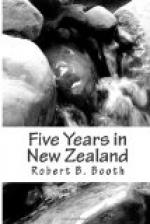It was in the month of May, 1864, when I received a letter from my brother in Bombay, saying that there were excellent openings in the engineering line there, to which he had interest enough to help me, and he pressed me to go to Bombay and try my luck. My brother was then representative of a large mercantile firm at Bombay.
I think neither he nor the others at home had ever divested themselves of the idea that I was not succeeding, and never would succeed in New Zealand, because I had not at once made a fortune out of nothing, or discovered gold for the picking up. Of course, they were not right. I had, considering my youth and ignorance on going out to New Zealand, done admirably. It was necessary to undergo a term of probation and education for the work of a sheep-farmer or any other in the Colony, and this I had not only accomplished, but I had been, and was, making money and a living, and had fair prospects before me should I decide to adopt the life of a squatter permanently. I consulted my friends and some of them were for following my brother’s advice, but something within myself kept prompting me in the same direction, and I began to feel more and more that I had mistaken my vocation, and that I was bound to try before it would be too late to get into the swing of the more congenial employment for which I was longing.
The wandering spirit, too, mastered me once more, and I wished now to see India and all I had heard and read of that wonderful land, as I had originally desired to see New Zealand.
I did not decide hastily. I was aware that my leaving New Zealand now would to some extent throw me back, if at any time in the future I decided to return, but I was still very young, not yet 22, and a year or two would make very little difference, and I knew that if I returned to New Zealand I could always command immediate employment. I decided at length to see India at any rate, and I wrote to my brother to that effect.
The disposal of my sheep, horses, and other small possessions, was soon accomplished, and one fine morning in May 1864, I found myself at Port Lyttelton, accompanied by a number of old chums who had come to see me off by the steamboat to Dunedin, from whence I was to proceed by mail to Melbourne, and from thence to Bombay by the P. and O.
I felt sad indeed to look my last (it might be for ever) on the shores of Canterbury, where I had passed five happy years, endeared to me all the more on account of the varied and adventurous life I had led, and the good friends and companions I was leaving behind, and I leaned on the bulwarks of the little steamer as we passed out of the lovely bay and saw the shepherd’s hut, high up on the cliff, where we wanderers from the ship five years before had been entertained by the Scotch housewife to our first New Zealand dinner, then on to where we visited the whalers and the head to which we rowed in the Captain’s gig. The whole scene arose before me afresh; where were we all scattered to? I longed to do it all over again, and be with the old mates; and here I was, a lonely wanderer once more, leaving all to go away to begin a new life in a strange land. It was not easy, but I tried hard to think I was doing right.




